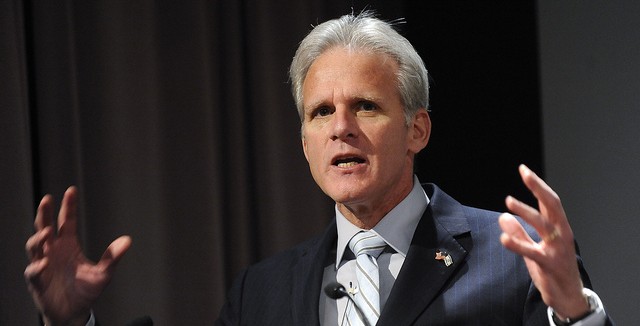In an exclusive interview with The Tower’s Benjamin Kerstein, former Israeli Ambassador to the United States Michael Oren shared his concerns over Iran’s nuclear program, including his apprehension regarding the reported nuclear deal emerging from ongoing negotiations between Iran and the P5+1 powers. The full interview will appear in the April issue of The Tower Magazine.
While discussing a number of the security concerns and challenges Israel currently faces, Oren stated, “I have long regarded the Iranian nuclear program as an existential threat and what I learned in office in Washington is that it’s not just one existential threat, it’s several existential threats.”
Oren stressed that while it is unclear whether Iran will sign the deal currently being deliberated by Tehran and the P5+1 powers, the negotiations stand to produce an agreement that, if accepted, would present Israel “with a deal that we consider a very bad deal.” In such an event, he says, Israel would “have to think about ways we can defend ourselves.”
Though Oren did not specify whether such measures would include an Israeli military strike, he emphasized that “Israel reserves the right and the duty to defend itself against any threat,” a right that he noted has been recognized by President Obama multiple times.
A best-selling historian, Oren concluded the interview by wondering whether future generations might view the present-day period as being adversely “transformational,” in particular stressing the severe dangers posed by a nuclear Middle East:
I’m quite convinced that we could be on the cusp of the nuclearization of the Middle East, which would change not only Israel’s reality, it could change human reality. And historians may look back on this a hundred years from now and wonder why people weren’t more clear-sighted. The same people who look back on other periods and see […] great dangers looming.
In his much anticipated speech to Congress on March 3rd, Prime Minister Benjamin Netanyahu similarly emphasized the dangers of accepting the reported deal emerging from negotiations with Iran, which he argued would ultimately assist the regime in its pursuit of a nuclear weapon. Netanyahu contended that a nuclear-armed Iran would result in widespread nuclear proliferation across the Middle East, as Iran’s neighbors would respond to Tehran’s nuclear ambitions “by racing to get nuclear weapons of their own.”
[T]his deal won’t change Iran for the better; it will only change the Middle East for the worse. A deal that’s supposed to prevent nuclear proliferation would instead spark a nuclear arms race in the most dangerous part of the planet.
This deal won’t be a farewell to arms. It would be a farewell to arms control. And the Middle East would soon be crisscrossed by nuclear tripwires. A region where small skirmishes can trigger big wars would turn into a nuclear tinderbox.
This past February, a report in The Wall Street Journal explored the anxieties of America’s traditional Arab allies across the Middle East, who have repeatedly warned that they would act to counter the rise of a nuclear Iran. Unnamed Arab officials stated that “a deal would likely drive Saudi Arabia, for one, to try to quickly match Iran’s nuclear capabilities.”
One week ago, the HIS, a leading analyst of the global arms market, released its Global Defence Trade Report, which revealed Saudi Arabia’s ascension as the world’s biggest importer of arms. The report further noted that “Saudi Arabian imports increased by 54 percent between 2013 and 2014,” and that “Saudi Arabia and UAE together imported $8.6 billion in defence systems in 2014, more than the imports of Western Europe combined.”
[Photo: uscpublicdiplomacy / flickr]




